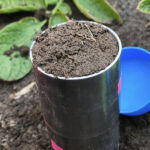Top: A G-17 permit was obtained for a small-scale food waste composting facility operated by Bennett Compost in northeast Philadelphia. Photos courtesy of Bennett Compost
The Pennsylvania Department of Environmental Protection’s (PADEP) Division of Municipal and Residual Waste issued its long-awaited General Permit WMGM017 (G17) for Source Separated Composting in late September. The permit creates a pathway for smaller scale food waste composting facilities, both on and off the farm. Approval to operate under this general permit is limited to facilities which meet all three of the following criteria:
- Does not exceed five acres for on-farm composting, or two acres for non-farm, small scale composting.
- Does not store more than 500 tons or 1,000 cubic yards/year of source separated food scraps, defined as pre and postconsumer food wastes that are separated from municipal waste at the point of origin for the purpose of recycling and composting.
- Does not store more than 3,000 cubic yards/acre of total materials at any one time.
The G17 permit applies to composting, vermicomposting and hermetiacomposting using larvae of black soldier flies. Waste streams accepted for non-farm, small-scale composting facilities are nonliquid waste and limited to yard trimmings and source separated pre and postconsumer food waste. Incoming food waste must be incorporated into the composting process, or in vessels, including worm or larvae feeding vessels, within 24 hours of receipt of the food waste at the facility. Incorporation of all other materials must occur within one week of receipt, unless otherwise approved by PADEP in the approved plans provided as part of the application.
This permit requires use of windrows, aerated static piles (ASP), or in-vessel methods for composting. The active composting phase must be maintained at a minimum of 55°C (131°F) or greater for at least 15 days for the windrow method and for at least 72 consecutive hours for the ASP or in-vessel method. The G17 permit requires that the compost be cured for a minimum of 30 days. The composting area shall be constructed in a well-drained area with a workable surface and slope of 2% to 4% to prevent ponding and control surface water. All storm water runoff should be diverted away from the composting area. The working surface should be firm, uniformly graded, and dry. Compost pad options include a compacted mixture of select granular material with adequate fine-grained particles to bind it together and reduce permeability, use of lime-stabilized soil blends, or paving with concrete, asphalt or geosynthetics.













